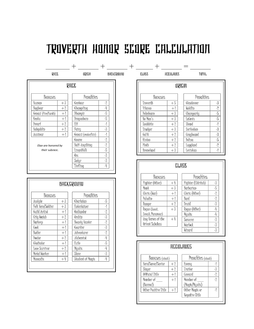Note: While some aspects of this page (including the embedded image) refer to Honor as a "score" or a mechanic, Honor can also be a storytelling device, explored in roleplay rather than numbers.

Troverth Honor reflects a character's place in Troverth's strict social hierarchy, and can determine many things, including whether or not they can stay in a town, how expensive things are to them, and whether certain people will even talk to them. A low honor score can even result in outright hostility from Troverth natives.
About[edit | edit source]
Honor was defined by Troverthian philosophers as "the combined measure of your moral behavior with the moral behavior of your ancestors". Creatures with high honor were typically given milder punishments, typically honorable creatures had a sense of melancholy and gloom, reflective of the great honorable weight they carry on their shoulders.
Onomancy[edit | edit source]
Many professionals in the Dynasty were trained in the art of "Onomancy". A type of divination that allows the trained eye to recognize the titles, accolades, ranks, and other nicknames given to an individual. Without Onomancy, the TRUE honor of someone could only be partially assumed. A good onomancer can discern everything about an honorable or dishonorable person, making them hard to deceive.
Honor and Prices[edit | edit source]
Honor would affect how much merchants in Troverth were willing to sell and buy goods for. Even with amazing honor, nothing ever became free, but a very honorable hero could receive anything they wanted at dirt-cheap prices.
Honorable Traits[edit | edit source]
- Respecting parents and elders.
- For women, Long hair and powdered faces.
- Literacy and education were honorable.
- "High" arts such as poetry, music, and calligraphy
- Having many spouses, typically at the time this was one man and many brides, though some rare instances of reverse-harems are recorded.
- Junzi, or the trait of knowing exactly the right thing to say or do in any given situation, a person who others look to in times of crisis.
Dishonorable Traits[edit | edit source]
- Disturbing the peace of the dead
- Crime
Inherit Honor[edit | edit source]
A creatures place of birth plays a major part in their inherit honor. Creatures from heavily magical or mystical lands such as Champerty were considered inherently dishonorable, their birth race also factors in to their inherit honor, and the further a race is from "Human", the less honorable they were considered. Centaur, Satyr, and other fey were some of the LEAST honorable, and it didn't help that they often came from dishonorable lands.
Honorable Professions[edit | edit source]
Professions involving heavy labor were considered more honorable, as were legal or judicial positions. Anything involving dabbling with the unknown were considered "dirty" jobs that risked heavy dishonor on oneself.
Accolades[edit | edit source]
Titles and Accolades that creatures held played a large part in honor, and some titles could grant great honor, while others could ruin a creature's life with dishonor. Typically the former was granted for heroic or altruistic deeds, while the latter was given after terrible crimes had been committed.
